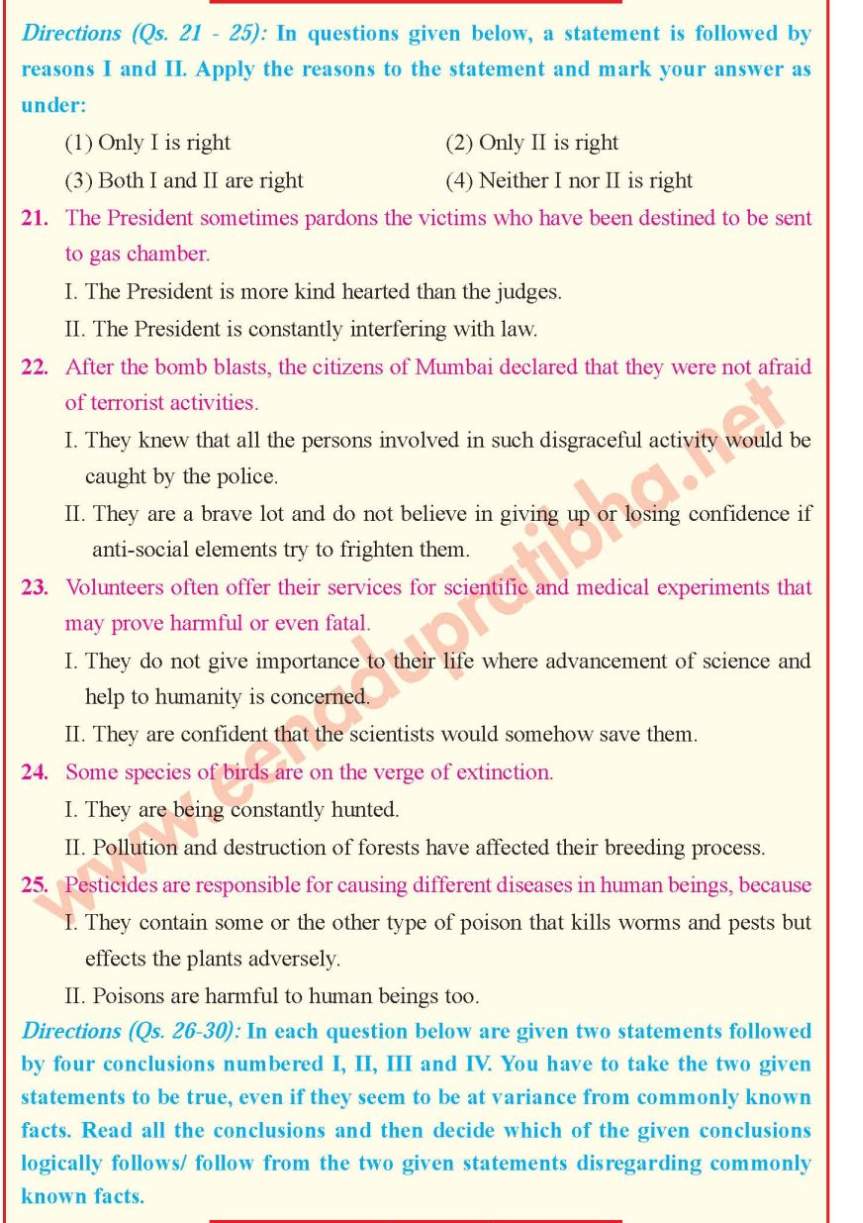|
#2
4th December 2014, 04:39 PM
| |||
| |||
| Re: Oriental Insurance Exam Question Papers
Here I am providing you previous year question papers for Oriental Insurance Exam for your preparation. Oriental Insurance Exam Question Questions: Directions: In this Section you have Six short passages. After each passage you will find several questions based on the passage. First, read Passage-I, and answer the questions based on it. Then go on to the other passages. PASSAGE—I The martyrs who laid down their lives for the freedom of the country, had a lofty vision of the future. They wanted the nation to be free from all the slavery and bondage. They wanted an India in which all the communities would live in perfect harmony and in which there would be no high class and no low class of people, the curse of untouchability having been wiped out completely. Women would enjoy equal rights with men and contribute their fullest to the making of a great nation. Such a vision was in keeping with the ancient glory of the country renowned for its splendid achievements in literature, art and culture. We must now revitalise this ancient culture of ours with tolerance as its masthead. If we forget or cease to take pride in our noble heritage, we shall have to face severe indictment in the court of history which is a ruthless judge and seldom spares the erring people. 1. The martyrs who died for the freedom of India wanted: (a) the country to be the strongest nation in the world (b) the country to rule over the other nations (c) the country to be free from slavery (d) the people to give up their antiquated customs 2. These martyrs wanted that: (a) there should be reservation in the jobs for the backward sections of the society (b) there should be perfect communal love and peace in the country (c) the old caste-system should be retained in the future (d) the women should look after their families only 3. We must strive with our total commitment to: (a) defeat and overcome the enemies of the nation (b) revitalise our rich past culture (c) inject scientific temper into our past culture (d) make scientific advancements 4. Our freedom-fighters envisioned that in free India: (a) there would be an egalitarian society (b) women would enjoy higher privileges and rights than others (c) the country would be taken forward by some selected classes of the society (d) industrialisation should occupy the top priority PASSAGE—II Dr S. Radhakrishnan, the illustrious philosopher statesman of India, was one of the greatest sons of our motherland. He cautioned the world against the domination of science in society. It is erroneous to claim that scientific knowledge would bring with it perpetual progress and a steady improvement in human relations. The recent period of great scientific achievements has also increased human misery: two world wars, concentration camps, atomic destruction, cold war, deadly wars in the middle east, Persian Gulf and at many other places in the world. Growth in human wisdom has not been commensurate with the increase in scientific knowledge and power. The fear of universal destruction hangs over the world. There is a feeling of disenchantment, anxiety and even despair. Science has failed to liberate man from the tyranny of his own nature. Mankind is passing through a critical period and an education of the human spirit has become essential. In order to remake society, man has to remake himself. If humanity is to survive, man must integrate his knowledge with a social responsibility. 5. Dr S. Radhakrishnan has: (a) emphasised that science should be banished from the society (b) opposed the teaching of science in educational institutions (c) favoured scientific thinking in life (d) counselled that preponderance of science in life does not necessarily generate happiness 6. The recent past of tremendous scientific progress has: (a) made the world a very happy place (b) led to global warming (c) brought about internal transformation in men (d) shown that human wisdom has not kept pace with galloping scientific knowledge 7. Man is despaired of science because: (a) science has given too much knowledge (b) science has brought him excessive material comforts (c) he has become a captive of science (d) he is confronted with the nightmare of total annihilation of the world 8. Man can save humanity only if he: (a) abandons science (b) brings about an internal transformation in himself (c) makes his life more comfortable with scientific gadgets (d) goes back to nature and primitive times 9. In this passage, the writer has tried to show that: (a) science is the only saviour that shall lead humanity forward (b) science can bring about an end to all the wars (c) social change comes with the advancement of science (d) human wisdom must grow proportionately with growth of knowledge to evolve a creative integration to help mankind PASSAGE—III In Asia and much of the Third World, trees are still destroyed in the old-fashioned way : they are cut down for fuel and cropland. In Europe, there is new and potentially more deadly culprit. The Germans call it ‘Waldsterben’, the dying forest syndrome. But the disease is far more than a German phenomenon. Since it was first observed by German scientists in the autumn of 1980, the mysterious malady has raced across Europe, blighting woods in countries as far apart as Sweden and Italy. Explanations for the epidemic range from a cyclic change in the environment to a baffling form of tree cancer. But the most convincing evidence points to air pollution. Indeed, saving the rapidly deteriorating forests of Europe will probably require a two-pronged strategy : an offensive campaign that includes the breeding of pollution-immune trees and a defensive scheme that calls for reductions in toxic emissions. But both will require more money than is currently being spent on such measures, as well as total commitment to protecting the environment. 10. According to the passage, which one of the following statements is correct? (a) There is less damage in Asia than in Europe (b) More forests are dying in Germany than anywhere else in Europe (c) A cyclic change in the environment is responsible for deforestation (d) Air pollution is the main culprit of destroying European forests 11. Saving the tress of European forests: (a) should not be difficult because of the advances in experimental research (b) appears to be a hopeless task and therefore pointless to undertake (c) requires a much bigger budget (d) demands vigilance and punitive measures against those who cut down the trees 12. The dying forest syndrome is a disease that: (a) is peculiar to the forests of Asia (b) has spread rapidly over the forests of Europe (c) is confined to the forests of Germany (d) has affected forests all over the world 13. The writer suggests that: (a) it is no longer possible to grow trees in industrialized areas (b) pollution-immune trees wil absorb toxic emissions (c) all pollution-prone trees should be destroyed (d) it is not possible to grow trees that remain unaffected by pollution 14. The writer’s approach toward the problem of forest devastation is one of: (a) tolerance (b) indifference (c) well thought-out strategy (d) despondency PASSAGE—IV One of the major crises facing the country is the looming water shortage. A recent report of the UN has named India among the worst countries for poor quality of ater. The report ranks 122 countries according to the quality of their water as well as their ability and commitment to improve the situation. Belgium is considered the worst basically because of the quality of its ground water. Rains failed in most parts of India last year and the vast areas of Rajasthan, Madhya Pradesh, Andhra and Orissa were in the grip of devastating drought. People without water turn desperate and violent. Villagers in Rajasthan last year attacked the Food Corporation godowns. Worse may be coming. With man refusing to control pollution (America, the world’s greatest polluter, refuses to cooperate with other countries) the world is getting hotter. This means that the great ice shelves (weighing billions of tonnes) of the Antarctic are collapsing. We cannot even conceptualise the dangerous consequences. Last century, sea levels in Venice rose by one step of a staircase. This century they are expected to rise by five steps. An additional cause for Venice’s sinking is the draining of underground water table due to industrialization. The water tables in our cities have also been going lower and lower. When ocean level rises, Tuvalu in the Pacific Ocean will be the first to go under the waves. Citizens of that country are already migrating to New Zealand. Will citizens of Maldives crowd into Kerala? Will another mass migration from Bangladesh turn West Bengal upside down? 15. Citizens of Tuvalu are migrating to: (a) Belgium (b) West Indies (c) Morocco (d) New Zealand 16. Belgium, is suffering acutely because of: (a) the sluggish pace of its economy (b) the discharge of industrial effluents (c) quality of its ground water (d) rising cost of living 17. Villagers in Rajasthan attacked Food Corporation godowns because of: (a) low prices offered to them for wheat (b) refusal of Food Corporation to buy wheat from the local farmers (c) no financial help from the government bodies (d) shortage of water 18. One of the reasons for Venice’s sinking is: (a) industrialization (b) its proneness to earthquake (c) felling of trees (d) civil construction Detailed Previous Year Question Papers for Oriental Insurance Exam: Oriental Insurance Exam Paper     pdf file atteched for more paper detail.................. |
